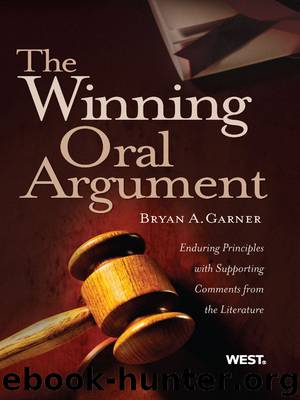Garner's The Winning Oral Argument: Enduring Principles with Supporting Comments From the Literature by Bryan Garner

Author:Bryan Garner
Language: eng
Format: epub
ISBN: 9781634592321
Publisher: West Academic
Published: 2014-04-14T04:00:00+00:00
48. If you’re an appellant before a “cold” bench, briefly explain the history of the case and the key facts before stating the controlling law and how the lower court erred. If you’re the appellee, decide whether you must restate the case in some respect.
A court that is not familiar with the facts and issues of your case must be introduced to them quickly before you go further into your arguments. Few at the appellate level are truly “cold” courts today, but you 132
must still try to gauge just how strong a grasp of the case the judges have.
(a) Classic statement 1. “An appellate advocate may find it necessary in a ‘cold’ court to present the case’s background and the advocate’s contentions more thoroughly before expanding on the argument.” Hon. Myron H. Bright, The Ten Commandments of Oral Argument, 67 ABA J. 1136, 1136 (1981).
(b) Classic statement 2. “I realized during my first argument before the Supreme Court of Arizona what I should somehow have found out earlier: that the judges simply did not read the briefs in the case before coming on the bench to hear oral argument. To me this is almost a waste of the time set aside for oral argument, which at its best should be a refinement and a polishing of the issues in the case, not an introduction to the facts out of which the litigation arose. But when in Rome, do as the Romans do: if the appellate court before which you are arguing makes a practice of not reading the briefs before they come on the bench, you had better be prepared to develop the facts in some detail.” Hon. William H. Rehnquist, Oral Advocacy: A Disappearing Art, 35 Mercer L. Rev. 1015, 1023 (1984).
(c) Warming up a cold bench. “In those days, as in the Court of Appeals today, the judges did not acquaint themselves with the record or the briefs, their purpose being to give the arguing attorney an opportunity of addressing them before their minds had even begun the opinion-forming process.” Hon. Whitman Knapp, Why Argue an Appeal? If So, How?, 14 Record N.Y.C.B.A. 415, 428 (1959).
(d) Giving a cold bench some background. “[D]uring my earlier days upon the court, before we adopted the practice of reading the briefs in advance of argument, I must confess that to me the oral argument was in most cases almost completely a waste of time. It was extremely difficult for me to follow the oral presentation of complicated facts with which I had no prior familiarity and when, a month later (as our practice then was), we came to conference and the preparation of opinions, the oral argument had gone almost completely out of my mind, so that my reliance had to be on the briefs alone in most cases.” Hon. Albert B. Maris (as quoted in Hon. John Biggs Jr. et al., “In the Matter of Oral Argument” (1955), in Advocacy and the King’s English 233, 240 (George Rossman ed., 1960)).
133
(e) Tabula rasa.
Download
This site does not store any files on its server. We only index and link to content provided by other sites. Please contact the content providers to delete copyright contents if any and email us, we'll remove relevant links or contents immediately.
Objection! by Nancy Grace(1778)
Apeirogon by Colum McCann(1701)
Anatomy of Injustice by Raymond Bonner(1664)
That Every Man Be Armed by Stephen P. Halbrook(1578)
Civil Procedure (Aspen Casebooks) by Stephen C. Yeazell(1554)
The Vaccine Court by Rohde Wayne(1508)
Injustices by Ian Millhiser(1497)
Storytelling for Lawyers by Meyer Philip(1461)
A Practical Guide to International Arbitration in London by Hilary Heilbron(1434)
Restitution by Restitution(1424)
Coercing Virtue by Robert H. Bork(1357)
Broken Scales by Joel Cohen(1352)
Tangled Webs: How False Statements Are Undermining America: From Martha Stewart to Bernie Madoff by James B. Stewart(1338)
The Tools of Argument: How the Best Lawyers Think, Argue, and Win by Joel Trachtman(1316)
A Matter of Interpretation by Antonin Scalia(1310)
INDEFENSIBLE: One Lawyer's Journey Into the Inferno of American Justice by Feige David(1292)
American Tragedy by Lawrence Schiller & James Willwerth(1274)
A Religious Orgy in Tennessee by H.L. Mencken(1250)
Tangled Webs by James B. Stewart(1245)
